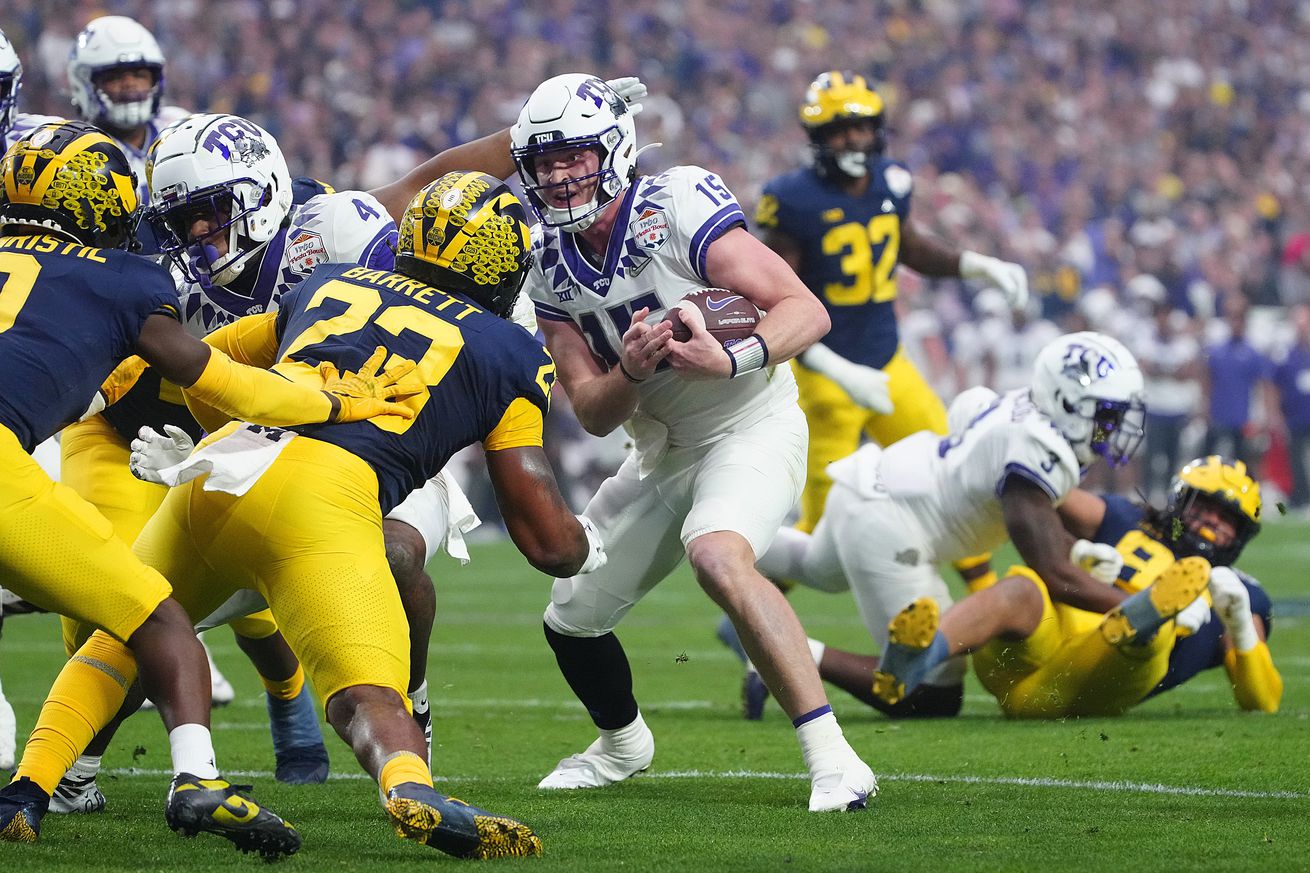Patrick Breen/The Republic / USA TODAY NETWORK
The Horned Frogs were ready for Michigan in more ways than one
The college football story that is currently captivating the nation? It is not new Colorado head coach Deion Sanders and his effort at turning that program around. It is not a thrilling final season of Pac-12 football, or what might be one of the more wide-open national title races in recent memory.
No, it is rather the ongoing saga involving Michigan, and the sign-stealing allegations that are rocking the college football world.
As we have all come to learn, allegations surround the Wolverines and assistant Connor Stalions, who was hired by Michigan in 2022 as a “football analyst” after spending seven years working as a volunteer. According to all the available reporting, Stalions created a system of in-person scouting to try and decipher team’s signals. While stealing signs — even with the use of television broadcast footage — is not against NCAA rules, “in-person scouting” is not permitted, nor is the use of electronic equipment to capture another team’s signals.
The latest twist in the saga takes us back to last season’s College Football Playoff. As the TCU Horned Frogs were preparing to take on Michigan, their staff had a plan. According to reporting from Ross Dellenger of Yahoo Sports, once the CFP matchups were announced, the Horned Frogs started getting some phone calls, warning them of what they were up against.
Not long after the CFP unveiled the 2022 semifinal matchups — Georgia vs. Ohio State and TCU vs. Michigan — the Horned Frogs staff began receiving phone calls from coaches across the country about what was a well-known fact in the Big Ten coaching community: that Michigan had an elaborate sign-stealing system.
Many of those on the TCU staff were unaware before the calls. Coaches from several Big Ten schools, including Ohio State, informed TCU coaches of the scheme.
“Literally everybody we talked to knew,” said one TCU coach. “They’d say, ‘Just so you know, they steal your signals and they’re going to have everything so you better change them.’”
One coach told the staff that Michigan “has the most elaborate signal-stealing in the history of the world.”
So what did TCU do? They put together a system of dummy signals and more, hoping to throw the Wolverines off. TCU mixed in some new signals with the old ones, instructing players to ignore the previous signals and call plays associated with the new signals.
But that was not all the Horned Frogs did. They also would at times use two different signals, sending in one play with the new signs, “freezing” the play, and then signaling in a second, dummy play using the old signs. Players were instructed to run the play as first called with the new signs, but the hope was that Michigan would buy the second signals, the ones they potentially knew.
They also tried sending in plays late in the play clock, to prevent Michigan from having enough time to adjust.
The plan worked, in part, as TCU beat Michigan 51-45 to advance to the National Championship Game. As found by Dellenger:
[TCU head coach Sonny] Dykes and staff crafted a game plan that, at least in part, used the dummy signals to fool coach Harbaugh and signaler Stalions. TCU scored first-half touchdowns on drives of 10 plays for 83 yards and 12 plays for 76 yards. The Frogs scored more points on Michigan than any team that season (51), eclipsing the next highest scoring opponent by 24 points.
“The guy [Stalions] was wrong a couple of times,” one TCU staff member said. “We rewatched the TV version of the game. You can see him standing next to the defensive coordinator. He tells something to the coordinator and he points in the air to mean pass. You can see the playsheet he’s holding with our hand signs on them.”
Still, they were not perfect.
“There are some times in the game that they still got us,” a TCU staff member said, “especially on short-yardage.”
We note that right now this story remains at the investigatory stage, and no direct evidence has been revealed behind the NCAA allegations.
Still, as more emerges, and reporting indicates that teams knew of Michigan’s system dating back to 2021, it does not paint the Wolverines in the best light.
Even if TCU was one step ahead of them.













